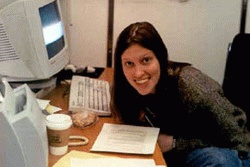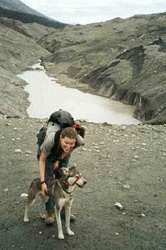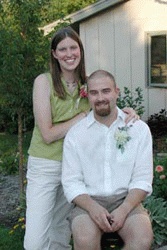|
Psychiatrists theorize there is a preexisting genetic blip on the curl of my DNA -- nestled snuggly between, say, blue eyes and long, skinny toes -- that tells my brain to scoop up all the transmitters it finds coating its neurons -- happily translating synapses from nerve to nerve -- and to flush them from my system. They say it's genetic -- hereditary -- passed to me from the seeds of my father and the belly of my mother long before my brain was fully formed. It's not supposed to be my fault.
Theoretically, it has to do with the neurotransmitters in my brain, serotonin and norepinephrine among them. They are wily, active chemicals the brain needs in order to get messages from nerve A to nerve B, no matter that they are next door nerve-neighbors. Without the neurotransmitters, nerve A is stuck screaming unintelligibly across the gray, tunneled horizon of my brain. Nerve A may as well be trying to transmit electrical impulses from across the Serengeti. And I, the being in the body at large, suffer the translation gap.
 |
| Heather at work in her office at the University of Alaska Anchorage. |
 |
My cranial nerves used to have to scream. The requests and denials, questions and orders, impulses and reactions were not being transmitted adequately across and through my brain. The relay system had all but stopped, leaving my head clogged with leftover messages like a kitchen sink full of broccoli stems too thick for the teeth of the garbage disposal.
I had to send in the reinforcements, to get well. I jumped on the pharmaceutical bandwagon. I wanted my networks upgraded, my mental messages adequately relayed. I wanted health and joy and hunger and sleep.
For me, Zoloft was the answer. For many others it was Paxil, Effexor, Wellbutrin, Prozac. We have all heard the commercial hoopla about family practitioners handing out antidepressants like they're candy. We've all heard about how many people are on antidepressants who needn't be. This essay is not about those people.
It Wasn't That the Therapy Wasn't Working
I had been seeing a therapist for nine months when she suggested I speak with a psychiatrist about the possibility of going on antidepressants. It wasn't that the therapy wasn't working, because it was; I learned a great deal about myself and set some attainable goals. But I wasn't getting better. I couldn't seem to gain back the twenty pounds I had lost to my already too-thin frame; my appetite refused to come back, I couldn't sleep through a whole night, and I cried about everything. I just couldn't get happy, and it had been almost a year. So, I took the Minnesota Multiphasic Personality Inventory (MMPI), blackening two hours worth of round true-or-false choices with my number two pencil, "I feel someone is watching me," the test asked; false, I replied. "There are people controlling what I do" -- false, I replied. "I cry sometimes for no reason," -- true. "I can't sleep through the whole night" -- true. The results came back to confirm what my husband, Joe, and my therapist already knew but what I refused to accept: I really was depressed. And I eventually agreed to go see a psychiatrist, if only to get more information about medication.
I arrived, as instructed, to the waiting room of Clinical Psychopharmacologists fifteen minutes early and proceeded to spend the next hour meditating on the upholstery of the couch on which I was seated. By staring at a weave of burgundy and beige fibers, I was able to avoid making eye contact with the room full of women also waiting to see a shrink. After I complained to the receptionist about my lengthy wait twice and was shushed and told to sit patiently twice, my psychiatrist, whom we will call Dr. Patterson, mostly because I cannot remember her name, having forced it from my memory like one throws out old clothes that remind them of a torrid lover, finally appeared to escort me into her office.
 |
| Heather and her dog Roxi on Root Glacier. |
 |
Wearing blue jeans and felt clogs, Dr. Patterson appeared, her lips glistening a wet shade of pink as she called my name. A matching set of long, acrylic nails tipped her fingers. She shook my hand, the nails pressing into my palm and guided me into her office, gesturing to a wooden chair in the corner, where I was to sit. Dr. Patterson asked some questions, mostly about my family history with depression and other forms of mental illness. While I spoke, she wrote things down, quickly, in scribbled shorthand on the long yellow legal pad resting on her lap. I described to her my nuclear family, who have all been, in their own time, labeled "clinically depressed." Dr. Patterson drew some lines between her jottings, and diagnosed me as genetically predisposed to depression. She handed me a prescription for Zoloft, asked me to wait a moment, and left the room to fetch some drug samples for me. The visit lasted no longer than fifteen minutes.
Dr. Patterson came back in an instant with the sample pack and told me how and when to take the pills, starting with 50 milligrams, one little blue pill, every morning for a week, then increasing my dose to 100 milligrams, two pills, a day. She sat back in her rolling chair and rattled off a speech she'd apparently given many times before on how Zoloft is considered "safe" by the medical community, but its interaction with the brain not yet "quite" understood. She listed the side effects of the drug: loss of libido, upset stomach, difficulty sleeping, diarrhea, and on and on. If I had any severe side effects, I should come back and we'd see about switching the medication. Otherwise, I would see her in four weeks, long enough for the medication to actively take effect, long enough to know if it was working for me.
She noted that because of my genetic predisposition to depression, I should take the Zoloft every day for at least the next four years, at which time we could reevaluate whether or not the Zoloft was still necessary. However, she stressed, speaking slowly, if I were to go off the medication, I would have a fifty percent likelihood of relapsing into another "depressive episode," in which case I would need to start back up. She noted that people who take antidepressants will often skip doses or stop taking their medication entirely. She emphasized this is a bad idea. She reiterated the drug's side effects. She spun her chair around to get my response. I nodded. Looking relieved, Dr. Patterson stood up, shook my hand -- again the plastic nails into my palm -- and ushered me back to the waiting room.
I've Always Been a Half-Empty Type of Person
I can't explain what it's like to be put on a medication that changes your personality. What does it mean to take my depressed self and change it to be a happy self? On the medication I was happy, I didn't cry too much, I started eating again, and I didn't experience any of the difficult side effects. These were good things. But after awhile, I began to wonder how much of the "me" on the drugs was really the "me" that's, well, really "me." I have always been prone to what Dr. Patterson would call "depressive episodes," and the more I think about it, the more I wonder if I'm just a melancholic type of person. There are the optimistic, glass-is-half-full folks, and then there are those who see the glass as half-empty. I've always been a half-empty type of person. Isn't that okay?
Are we supposed to take a survey and start medicating all the half-empty people in the country? What does this mean for society as a whole? That melancholy is a disease? Yes, I'll admit, I needed the medication at one time in my life. I was not functioning in a state of normalcy, and it had gotten to the point that I was physically unhealthy because of the depression. Does admitting that mean I'm supposed to stay on the drugs forever?
After seeing Dr. Patterson, I didn't immediately begin taking the Zoloft. Instead, I went to the library. I read about all of my alternatives. I spoke with a handful of people who had been in my situation. I read and thought and wrote and thought some more and I (tried to) sleep on it for about a week.
And then I crashed. For three days I could not get out of bed. I could not stop crying. I couldn't eat, and I couldn't sleep. On day number four, I followed my first little blue pill with a glass of cold water and a long shower.
The first time, I was on the meds for about three years. My insurance changed during this time, and then, later, I didn't have insurance anymore. The insurance change brought me to my second psychiatrist, who was more helpful than my first. I don't remember his name either, but I do remember his kind face and his full, graying beard. After seeing Dr. Patterson in nothing but jeans, I no longer expected the psychiatric community to be concerned with professional attire, so, on our first appointment, I was a bit startled to see the knot of a tie peeking out from underneath Doctor Number Two's v-neck sweater. Dr. Two sat me down in his brightly lit office and took an hour to sit and listen. He nodded politely now and then, and asked new questions when I had run out of things to say about the old ones, but for the most part, he simply looked me in the eyes and listened. I told him about Dr. Patterson's diagnosis, her assertion that I should remain on medication for at least four years, and then maybe even for the rest of my life. He told me the literature all shows that people can taper off any time they so choose, and that after six to nine months of a "high-serotonin" lifestyle, many people successfully taper off their antidepressant medication for good. As far as he was concerned, I could taper off the medication any time I liked. At the time, I was working on my senior thesis to graduate with my bachelor's degree summa cum laude. We both agreed this was not the time to discontinue the medication. After that, I planned to enter graduate school, and we agreed that was not the time to discontinue medication, either. He thought I should wait until I was in a period of relative calm in my life, with no major stresses or changes, before taking myself off the medication. I agreed. I thanked him for his time, pocketed the prescription for a refill, and unfortunately, never saw him again.
 |
| Heather camping. |
 |
In graduate school, without viable health insurance, I was lucky enough to have access to a mental health nurse practitioner who could refill my Zoloft prescription, but who, for all intents and purposes, treated me with kid gloves, agreeing with everything I said, so that, if I mentioned my need to blow up the campus center, she might have replied, Yes, what a good idea. I saw a different nurse practitioner the second time I went in, and I explained my desire to taper off my medication during the following summer. She agreed.
I went to schedule an appointment to see her in June, after school had let out for the summer, and was told that I would have to pay one hundred dollars to be able to use the student health center during the summer, as I was not taking summer classes. I was between jobs and paychecks, and paying one hundred dollars to see the nurse who was only going to reaffirm what I wanted to do anyway, seemed impractical.
So, I hopped online, determined to find a way off the meds that was safe, effective, and free. One of my best friends had found herself in this situation the previous summer: she only had one bottle of pills left, and, as a recent graduate from college, she too was without health insurance. Unable to pay to see another psychiatrist for a refill or medical advice on going off the medication, she simply cut her thirty pills in half, and took 50 milligrams a day for 60 days. She didn't have any problems with withdrawal, and I figured that I, too, could successfully discontinue the Zoloft without the help of a doctor.
Online I was surprised to find chat rooms and discussion groups full of people also trying to get off antidepressant medication, people sharing their doctor's advice with one another. I scrolled through lists of ways to get off the meds, jotted down some notes, and made myself a chart of days and doses, dwindling my medication intake slowly over a period of months.
I started by alternating my intake, day by day. On the first day I took 75 milligrams, and the second day I took 100 mg.; on the third day, I was back to taking 75. I did this for a week. For the second week, I took 75 mg. every day. On the third I alternated between 75 and 50. Then a week of 50 each morning. Then a week alternating between 50 and 25, and that's when I started getting really dizzy, feeling the effects of withdrawal. And I began to wonder, what kind of drug is this that I've been putting into my body for the last three years?
Waves of Withdrawal
How can I explain what Zoloft withdrawal felt like? It was like getting up too fast after eating nothing but jelly donuts and drinking oily, drip coffee all morning: your head spins just around halfway, your visual landscape turns dark and spotty, you lean a bit off to one side and end up grabbing the door frame for stability. The waves that came over me felt much like that, except they weren't from a lack of calories and I didn't have to get up to feel that way. It happened when I sat, while I stood, during periods before sleep when I was comfortably prone, nuzzled in the crook of my lover's arm. It happened on the stairs, while I drove, while I showered.
On days when the waves came over me with such force as to make me nauseous, I spent the afternoon with my head hooked over the beige lip of the toilet, munching saltines and willing my stomach to keep hold of its lunch. Later, I would end up in the fetal position on my gingham sheets, the overlapping pattern of row after skinny row a sickening muddle before me, and begin to chart the time between each wave of dizziness -- a gingham graph of waves and breaths spread out horizontally across my view. Not able to concentrate on the second hand of my watch, I counted each breath between the zaps: one, two, three -- zap -- one, two, three, four, five, six, seven, eight -- zap -- one, tw -- zap -- one, two, three, four, five -- zap -- and so on. The zaps came several times a minute, beating against my brain like a force, carving their pattern into my skull the way the tides shape the rocky coastline: slowly, carving wave by wave, minute by minute.
 |
| At the post office in the historic mining town of Kennecott, Alaska. |
 |
The waves -- I don't think I've quite described them properly. You see, I didn't lose my sight each time, surrendering to the black background; I was not constantly tipping off balance and reaching out for stability from the world around me. How can I explain them, they were all so different, so random, like snowflakes and fingerprints -- each their own masterpiece. Some intense, some subtle, they pulsed their way through my frame, forging new paths, eking out new patterns, stitching their way across limbs and over organs, a quilter's needle weaving between brightly colored squares. Up close, within each square, the line of thread is nothing more than a tangled mass of stitches -- child's play -- but take a step back to look at the whole quilt and you begin to see the meticulous pattern, the brain grouping the loops and lines until they make visual sense -- tiny snowflakes congealing into a frosty drift, fingers crowning a palm to become hand.
Except I don't know if there was a greater pattern decorated across my body by the medication's waves and zaps. I don't understand the artist's desired effect; the pattern of the finished product eludes me. There were surges that started small, like a wish, in the center of my brain, quickly gaining momentum, spiraling outward to blast like the flower of a fireworks display, all colors and glow in the back of my eyes. And then, three breaths later, a gentle wave would come from my left temple, spreading like glitter through my head, stopping almost as soon as it began. Then another, this time starting from the pinky finger of my right hand, galloped up my arm to end warmly near my heart like a hug. And then, with no warning, a shock -- strong and firm -- that started in the center of my skull and reverberated down my spinal cord and into my stomach, making it jump like I was riding a roller coaster, screaming down that first steep hill. Those zaps are the ones that made my face squish up -- betraying my discomfort -- the ones that made the people around me ask, Are you okay?
As soon as they came, as soon as my eyebrows winced, they were gone, my equilibrium found. And I waited, counting each breath, for the next one. I'm still waiting, breath by breath, for the greater pattern to be revealed, for the work of art that was my vertigo to assemble itself into a whole.
I've looked, searched and surfed the Web, looking for clues to the question of the larger pattern etched, the quilt that is my body and my brain in Zoloft withdrawal. I've read about people whose reactions were so strong, their zaps felt electric in nature, coming on with such force as to make them scream back a response. But for the most part, people don't usually have withdrawal symptoms like I did. People usually don't have any symptoms. My friend didn't have any, the one who clipped each of the thirty pills in half, lovingly, like a father cuts the umbilical cord of his newborn son, separating his child from the security and warmth of his mother's flesh.
If You Could Only Put Your Finger On It
The more I talk to people about antidepressants, the more the camps of opinion form. There are people like my mother, who believe that medication is a good thing for people as a tool, and only a tool, to be wielded like a hammer in the recovery process and then shut back in the toolbox. She thinks medication should be used during therapy, as a kind of boost to help the process of learning new ways of living and thinking about the world. Once one's major problems are solved, the medication should be discontinued.
There are people who think most of America doesn't need antidepressants, that they should be reserved for the super suicidal. These are the people who are completely against the medical establishment and science as a whole, who tell me a little bit of meditation, a little exercise, and a dab of St. John's Wort would do me just fine.
If depression was an illness you could put your finger on. I've had more than one psychiatrist, who, frustrated with my hesitation about taking medication, has compared depression to diabetes. It was my first therapist who looked me in the eye, across her cozy office full of ficus plants and pillows upholstered in warm, peaceful shades of brown and red. She said, Heather, if you had diabetes and needed insulin shots every day, people wouldn't expect you to just figure out a way to make insulin with your mind, would they? No. And you're sick like that too, and you need an antidepressant to keep your mind healthy. It's not your fault if there's a stigma attached to depression. You deserve to be well, regardless.
But here's the problem. You can't test for depression like you can for diabetes; there's no blood test they can run, no urinalysis. There are some questionnaires, like the MMPI, that look for warning signals -- symptoms -- but which cannot actually detect the disease. None can actually prove that you're depressed because of a genetic brain malfunction.
Desperate to Stop Taking Antidepressants
In my search for some sort of understanding of my own cranial troubles, I have come to understand something else. There are hundreds, maybe thousands, of people like me living out in the world: young, broke, and desperate to stop taking antidepressants. One day, after feeling so awful I had to leave work early, I came home, hoping to find some information on the Internet. Sitting down in front of my computer, herbal tea in hand, I began reading messages posted by folks just like me, trying to get off antidepressants and looking for answers and support.
Posted By: Kristin, 10.3.00
The thing that has me worried the most right now are these inexplicable, weird, shock-like things that I'm getting. Could they also be withdrawal? They occur when I'm walking around (for the most part), or when I move my head, although I can't really describe it as dizziness. It's just a sensation that sweeps over me once in awhile (but many times a day) that starts as a tingling in my head, and then sweeps through my body, as if to say…GET BACK INTO BED!
I stared back at the glow of my computer, scrolling down, my eyes glazing over as I read message after message from people who felt like me. I read hundreds of these messages, brief and full of misspellings, plastered over chat rooms, bulletin boards, and discussion groups, fervently typed and posted late at night by those who cannot sleep, like tiny Morse coded messages, click, click, clicked relentlessly into keyboard after keyboard, sent out into the ether that is cyberspace, in the hopes that somewhere, at say, 5:45 a.m. on July 16, someone else is unable to sleep, unable to kick the fix that is their prescription antipsychotic, feeling alone, and willing to lend a hearing hand.
Posted By: In the woods, 11.7.99
I've been on Zoloft for about 4 mths., and now trying to get off anti-depressants for good. I did taper down, and now am not taking any, but I feel flu-like -- achy, headaches, nausea. Unfortunately my doctor knows little about this (I think the GP's are learning from us about these drugs!!) I hate to just give up because I don't feel well, but it's hard to keep life moving along when you feel rotten.
There are a series of tightly knit Web rings full of posted messages: brief, heartfelt, and terrifying, each one pinned-up by a frightened depressive screaming their message out into the world full of lonely, computer-faced depressives, until their words are read and answered, and slowly, through the fog of the side effects of Selective Serotonin Reuptake Inhibitor withdrawal, closely linked groups have been formed, rings of desperate people who have come to find security and camaraderie amongst their web-surfing buddies, friends they know only by the sign-on name "BikerMax" or "Lon3254," but with whom they develop a meaningful bond nevertheless.
Posted By: Lisa, 6.5.00
HAS ANYONE HAD ANY SUCCESSFUL EXPERIENCES WITH GOING OFF OF PAXIL? I AM SO TERRIFIED.
I have been sitting here reading all of the traumatic experiences everyone has had with Paxil withdrawal. I am so scared. I am feeling so dizzy and exactly how people have described, like my brain is swimming around in my head, and not really attached like it was before. I feel like I have just stepped off of a spinning roller coaster and I'm trying to get my equilibrium back. It's like I will turn to look at something and my brain will take a few seconds to follow my eyes, and process what is going on. This feeling has been freaking me out. I am so scared that it will never go away. I am feeling so alone and scared. No one understands me around here regarding this situation. The psychiatrist who prescribed this was totally uninformed about any kind of withdrawal symptoms. I couldn't believe it.
I imagined all these people sitting, dizzily at their computers, their brains going through strange adjustment periods, wondering where the cleaning crew is supposed to work in the new, medication-free zone, wondering exactly what to do with so much serotonin and so little electronic advice.
Eric, 8.14.00
Has anyone heard from Allison lately? She hasn't posted in awhile. Allison? Are you ok?
Their mental networks, like mine, were flailing about, hopelessly trying to find connections, and here were all these smart people, suffering from withdrawal -- from network confusion -- creating their own networks of communication among tiny phone-lined links between terminal after terminal across the world, at all hours of night and day. They offer support, they cry through their keyboards, dizzy as they may be, they are trying to rebuild what has been broken down.
Posted By: Lance: 7.25.00
My symptoms, by the way, were feelings of having my brain "unplugged" for split seconds at a time. This could be hundreds of times a day with no relief even during sleep.
Posted By: Alex, 9.27.00
I was on Zoloft for 4 months and then discontinued use (my script ran out and I wanted to see if I felt better than I did when I went on it). About 24 hours after not taking my dose, I started feeling dizzy. Real sort of 'dizzy' feelings - which I assume are similar to what you describe as your brain being unplugged. I was worried after a week of this and went to a doc who said it sounded like withdrawals. So I went back on - and the feeling went away almost immediately. Now I am on 100 mg and plan to be here for a while. I will give it a year - and then hopefully I will have changed my lifestyle somewhat to help me deal with my depression and stress. My doc says I might have to be on medication forever - which scares me - but if it means I can feel like this then I guess I don't care. (Is that me talking or the Zoloft?)
I never typed any responses to these postings, but reading them became a kind of sick fascination, and after a couple hours, I turned off the computer in angry disgust. I became scared, too, at all the people in this country just like me, suffering from withdrawal and feeling more comfortable discussing their problems amongst strangers with screen names than with their physicians.
Are You Sleeping Through the Night?
After not taking the pills for over a month, the waves had mostly subsided, and my brain was more like a river than an ocean; there was a current, and sometimes it was choppy, but it wasn't guided by tides and swells. I didn't read the messages posted on the bulletin boards and chat rooms anymore; they frightened me too much. So many horror stories have bled themselves out across my gray computer screen, I thought it was time to start dealing with myself, and let the chat room folks take care of each other.
 |
| Heather and her husband, Joe. |
 |
I stayed off the medication for about three months, and then, at the prompting of my partner, I went and saw the mental health nurse practitioner at the University again. I sat down in her office and told her I didn't want a lecture about discontinuing my medication without medical support. She didn't give me one. I was there to find out if I was happy off the medication, to discuss other therapeutic options besides the medication, because I thought I was functioning fairly well off the meds.
She proved me wrong, asking questions, Are you sleeping through the night? Are you waking up feeling rested? My answers formed a list of symptoms, spread out before us in a long, unhappy line: sleeplessness, inability to concentrate, loss of appetite, moods that withdraw me from the world, irritability, a feeling of being "on edge," and loss of motivation. The more we talked the more I realized, I may need medication for the rest of my life. I may be in that small percentage of people who really benefit from taking antidepressants all the time.
I told her about a conversation I had with my best friend earlier about the ordeal and my friend said, plainly as ever, We all deserve to be happy. My practitioner agreed. Listen to your friend, Heather. It sounds like you haven't been feeling like yourself lately.
Myself? I thought. Does that mean that the Zoloft-medicated me is really Me? That the unhappy me is just a sickened me? And for the first time, this made sense.
© 2002 by Heather Villars. All rights reserved
|
 |
|




